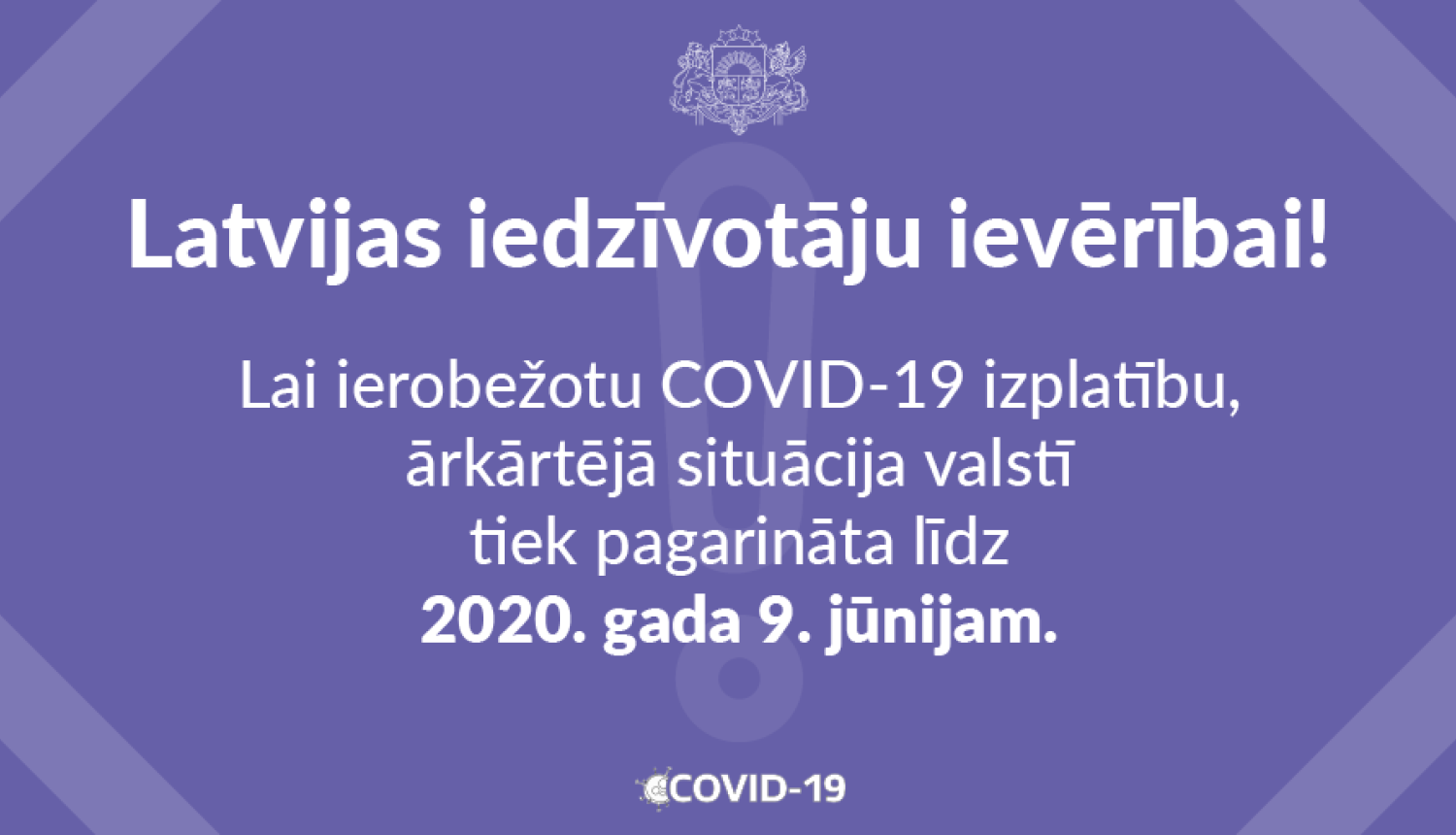On Thursday, May 7, the Cabinet extended the emergency until June 9, while deciding on a gradual removal or reduction of individual restrictions. A mandatory prerequisite for reducing these restrictions is that all physical separation and strict daily compliance with epidemiological security measures continue in all areas.
Prime Minister Krishjanis Karins: “The government's strategy for the next phase of Covid-19 limitation will be based on strict health measures at home and a gradual reduction in restrictions. We will take a step by step so that the limits are minimal, but at the same time the virus will no longer spread.”
The decision is based on the criteria approved by the government on the basic principles and criteria governing the possible mitigation of the measures introduced during the Covid-19 crisis. The lifting of restrictions assessed the epidemiological situation of Latvia, the ability of the responsible authorities to detect infections and to find contacts, as well as the capacity and situation of health authorities abroad. The criteria are measured over a period of four weeks and the lifted restrictions may be changed in both the direction of tightening and reducing the limits, depending on the fulfilment of the criteria.
From 12 May, restrictions on education, sport, organising and gathering events, transport and tourism will be reduced.
- Education and sport
In the field of education, all forms of learning will continue to be remote, including at present no child camps will be organised.
Under the conditions of epidemiological security, pre-schools will be able to decide, together with local authorities, how to organise the training of children aged 5-6 in this school year – on-site or remote.
Subject to the specified physical separation and epidemiological security measures, on-the-spot consultations will be allowed to prepare for national examinations or professional qualification examinations. Although mandatory examinations have been cancelled for pupils in Class 9, they will also be allowed to have access to counselling on-site. T
he Minister for Defence will take a decision on the development of the training process in military education institutions, while the Minister for the Interior will adopt it in the education institutions of the home affairs system.
On-site training or training for non-contact sports will also be organised, subject to the following conditions:
brings up a maximum of 25 persons in one training group at the same time;
indoor working time is three hours, outdoor time is unlimited;
training is conducted by a certified trainer;
respects a two-meter distance;
does not physically overlap the flows of various training groups;
training does not involve children under seven years of age;
must be observed; instructions from the manager and coach of the site;
must follow other physical separation and epidemiological security measures, which will be developed in cooperation with the Ministry of Health.
Measures and Assembly
If it is possible to ensure the two-metre distance of each other and the other safety regulations laid down by epidemiologists, it will be allowed to organise public and private events, as well as meetings, walks and pickets at indoor and outdoor meetings of up to 25 people. Also, organized pursuit of religious activities will be allowed. Private events at home will also have to take into account the area of the apartment so as not to exceed the number of people who comply with the instructions of epidemiologists.
The measures in which a visitor will participate in the light vehicle will not be subject to the prescribed limit on the number of people.
The duration of the outdoor events will not be limited, but will not exceed three hours indoors. The organiser will also have to ensure compliance with the restrictions and the availability of disinfectants.
The working time of cultural, entertainment, sports and other recreational sites will be extended from: 7.00 and up to 24.00.
Public and private sports events organised under the Public Entertainment and Celebration Activities Safety Act will not be allowed.
The Minister for Environmental Protection and Regional Development will be able to approve measures to ensure social and physical separation, which should be observed when organising meetings, walks and pickets.
On the other hand, the Minister for Culture will have the right to regulate the procedures by which compliance with the requirements of physical separation and disinfection in cultural institutions, such as libraries, museums, etc.
It is recalled that, in the absence of a distance of two metres, no more than two persons or persons living in the same household, their parents and their minors, may still be able to gather at the same time in public indoor and outdoor areas if they do not live in the same household or if they do not live in a single household or persons carrying out work or service duties.
- Trading centres
In the future, all shops will be working in the malls on holiday and holiday days. The restriction has been lifted that only food stores, press outlets, pharmacies, vaccination offices, optics shops, animal feed shops, chemical cleaning shops, hygiene and farm boutiques, as well as construction and horticulture boutiques are operating in malls.
- Transport
The Ministry of Transport will have to prepare measures approved by the Minister for Transport to ensure the epidemiologically safe use of public transport, including the obligation to wear mouth and nose cover in public transport.
- Tourism
After 12 May, tourism services are allowed to be organised only in Latvia, Lithuania and Estonia. For 14 days, self-isolation in the residence will not apply and for Latvian nationals and long-term residents, as well as for foreigners who have not visited countries other than Latvia, Lithuania or Estonia in the last 14 days.



